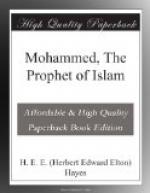Being firmly convinced of his call, Mohammed, with characteristic caution, began to propagate his principles, for years being content to deal secretly with individuals, beginning with those of his own household. His wife acknowledged and encouraged his claim, and gradually he gathered around him an increasing circle of devoted followers, some of whom had more confidence in him and his pretensions than he had himself. This was particularly true of Abu Bakr, a rich and popular merchant of Mecca, who, having acknowledged the claims of the prophet, followed him with implicit obedience and unwavering devotion. He threw himself whole-heartedly into the work of proselytising, and the progress of early days, although slow, was largely due to his indefatigable energy.
As the membership of the new society increased, rules were framed, based upon the “revelations” which Mohammed now periodically received, and each member was compelled to subscribe to the most stringent regulations. Idolatry was strongly condemned and the unity of God emphatically asserted. Certain Jewish and Christian religious ordinances were imposed as a condition of membership, while unswerving loyalty to the prophet was demanded. License was given to the members to practice outwardly the old rites and ceremonies of Paganism, in order to arouse no suspicion, but the existence of such a society, in spite of all precautions, could not long remain unnoticed, and the time came when the prophet and his followers were compelled to make public confession of their faith. Persecution followed, in which the poorer members suffered more than their richer brethren. Mohammed himself received the protection of the head of his clan, and for eight or ten years carried on a campaign of words. Margoliouth, in his life of Mohammed, likens the prophet to a player in a game of cards, who, having received a good hand, plays his cards with consummate skill. He took advantage of every opportunity in strengthening his position, and having a clear-cut policy before him, subordinated everything to its furtherance. He was a powerful preacher, but owing to his ungovernable temper, was not so successful in debate; hence he produced a “revelation” forbidding him to engage in public controversy! He showed great diligence in seeking information that enabled him to produce his revelations in a style consistent with his claims. Being entirely dependent on hearsay, he obtained but a sadly distorted account of truth. The Koran is full of glaring errors, which, for centuries, have baffled the ingenuity of the Moslem doctors. Yet the prophet presumptuously claimed that his, being the last “revelation,” was the most important, and more reliable, and the differences that were apparent were due to the corruption in time of the text of the former “revelations”—i.e., the Hebrew and Christian Scriptures!




